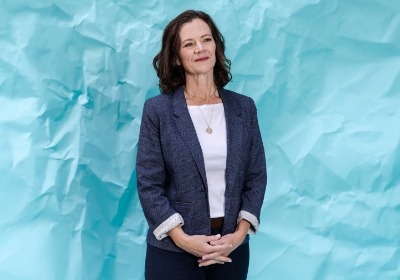From a very young age, Reece Fong has been guided by a sense of purpose.
Sure, his stated goal of becoming a doctor has never wavered. But for the 21-year-old UCLA graduate, who benefited from having supportive parents, teachers and members of the community, nurturing young people has always given him purpose.
Whether helping to coach swimmers at the local Boys and Girls Club, tutoring high school students preparing for the SATs, mentoring adopted children from China or spending spare hours at a hospital pediatrics unit, Fong has sought out opportunities that feel meaningful to him.
“To me, volunteering is great, but it’s something that I don’t think is useful when you just put it on a piece of paper or check off a box,” he said. “I was searching for volunteer opportunities that I enjoy a lot but can help people — especially kids.”
Fong feels a sense of fulfillment from volunteering because it allows him to have an impact on the children with whom he interacts. “I can go through life, no matter what kind of hardships I’m facing, no matter what difficulties there are,” he said, “and still be a beacon of hope and light for other people.”
The benefits of purpose
A recent report from the National Scientific Council on Adolescence spotlights why developing a sense of purpose is a key element of healthy development in adolescents.
“When people feel a sense of purpose in life, they reap a whole host of benefits,” said Anthony Burrow, an associate professor of psychology at Cornell University and a coauthor of the report. “Purposeful people live longer. They have a better physical health profile. It’s not just that they live longer, they literally are physically and physiologically healthier. They sleep better. They have a bigger and deeper social network. They’re less lonely.”
The NSCA report describes purpose as “a self-organizing and forward-looking aim.” Other researchers, including Stanford psychologist William Damon, define purpose as “a stable and generalized intention to accomplish something that is at the same time meaningful to the self and consequential for the world beyond the self.”
Purpose differs from goals because “goals are terminal. You can accomplish a goal; you can’t accomplish a purpose. A purpose is always an aim,” Burrow said. “When I accomplish a goal, it’s my purpose that tells me what I am going to pursue next. It’s the path to get to wherever you’re trying to go.”
While there has long been research into purpose among adults, there is less about adolescents and purpose. But scholars believe the roots of purpose develop during adolescence.
“Adolescence is such a fascinating time for studying development of purpose, largely because it’s such an important time for figuring out who you are and figuring out your identity and, really, what are your values? What are you committed to? What broader aspirations do you have for life?” said Patrick Hill, a professor of psychological and brain sciences at Washington University and a coauthor of the NSCA report. “All of those things go hand in hand with a sense of purpose, or a sense of direction.”
Burrow, at Cornell, said exposing youth to opportunities that “they can see, can appreciate and can grapple with” makes it easier for them to navigate toward a prospective aim.
“A majority of people end up feeling purposeful, so this is by no means a rare commodity in the world,” he said. “We should talk about purpose, and we should talk about its value and utility in people’s lives.”
What is “purpose”?
Purpose, researchers say, involves an exchange between an individual and his or her environment. To cultivate purpose, it is important for adolescents to be exposed to diverse opportunities that allow them to explore or discover different paths.
“It’s finding things that are meaningful to you — not just things that you might be good at,” said Leslie Leve, a professor of counseling psychology and human services at the University of Oregon and a coauthor of the NSCA report. “It doesn’t have to have a global impact. It is just something that you find intrinsically meaningful, motivating or interesting that keeps you going, that is forward-looking.”
The exposures can come from the young person’s community, school, church, friends, family or even from social media. Fong’s experience during middle school, as a member of the swim team at the Boys and Girls Club, led him to return to the club years later as a volunteer assistant coach. At school, he watched how his math and history teachers engaged with and supported students, then followed that path as he began tutoring.
Sometimes chance encounters trigger purpose, said Leve. “Perhaps you’re at the library, and there’s a performance going on in the courtyard, which sparks an interest in singing, or drama, or something that the person didn’t even know was there.”
The special challenges of poverty
The NSCA report acknowledges that some youths who are part of underserved or marginalized communities may face challenges that make it difficult to explore and engage in their desired purpose. “The adolescents who face the most challenges cultivating purpose,” the report says, “are also among those who could benefit from it the most.
“Youth in poverty who have a greater sense of purpose are less likely to engage in negative behavior that can be associated with the stresses of poverty,” the report says. A sense of purpose can limit the negative consequences of racism. That is why the cultivation of purpose is so important, but also why it is crucial to create opportunities for marginalized groups.
“We could all have a sense of purpose in lots of different areas, but if we’re only exposed to this little sliver of opportunity in life, maybe what would have resonated is not in that sliver,” Leve said. “The goal is to open that window and make as many exposures to different kinds of things that a person could be interested in.”
Despite the severe headwinds some may face, said Burrow, the associate professor at Cornell, there are times when the challenges that come from marginalization can actually spark the pursuit of purpose. “We know that young people and people who’ve experienced marginalization oftentimes end up feeling purposeful.”
Hill, the professor of psychological and brain sciences at Washington University, said researchers have codified purpose into five broad domains: financial occupational purpose, pro-social purpose, creative purpose, personal recognition purpose and activist purpose.
With a financial occupational purpose, people strive toward success at work or making a difference in their occupational field, Hill said. Pro-social purpose involves helping one’s community or helping others in need. “This is where a lot of environmental aims often fit, such as striving toward combating climate change and promoting environment health.”
People with a creative purpose, or a creative orientation, strive toward producing literature, visual arts or music. “It’s often tinged with other themes,” Hill said. “We hear from artists who might be using their art for promoting their community, for promoting social justice initiatives or other community initiatives.”
Less common, Hill said, is personal recognition purpose, in which someone is striving to gain recognition. “It’s not as much, ‘I need to be honored or awarded.’ It’s, ‘I like being recognized by my colleagues. I like being recognized for the work I do.’”
Finally, there is activist purpose, where people have aims related to social change and social movements.
“None of these things are necessarily in contrast to one another, and some themes often work hand in hand,” Hill said. “But those are the five broad categories we’ve heard from people when we ask them this big, daunting question: ‘What is your purpose?’”
Thinking big
Young people, the NSCA report emphasizes, are particularly motivated to pursue a sense of purpose when facing societal or global challenges, such as the recent COVID-19 pandemic, environmental issues or situations that might put their mental health at risk.
“When adolescents have anxiety about climate change, this can, in many cases, promote their feelings of purpose related to protecting the planet,” the report says. “Ultimately, youth want to take actions to address a global threat.”
For adolescents who are especially committed to helping others, purpose is associated with greater personal growth and integrity over time. And the benefits to mental health cannot be overstated, researchers said.
“If you have a sense of purpose, it can help you through those tough times when something bad or unfortunate happens in your life,” Leve said. “It gives you this protective factor — a buffer that can be protective against depression and anxiety.”
The report comes at a time when research into adolescents is growing and maturing.
“It’s really an interesting moment for adolescents. There’s national interest in this; there’s international interest in this,” said Andrew Fuligni, co-executive director of the UCLA Center for the Developing Adolescent, which houses the NSCA. “We want to change how folks think about adolescence and understand how adolescence presents us with an opportunity to learn how we can best support and invest in our young people, so they can make a successful transition into adulthood.”
The NSCA report shows ways that adults can help to cultivate purpose in adolescents, including creating equitable and inclusive educational, extracurricular and vocational opportunities, and providing emotional support for youth as they try — and sometimes fail — at new things.
For their part, youths can cultivate purpose in a number of ways, such as taking advantage of opportunities in the community, at school, online and through friends and family; exploring a variety of activities to discover new interests; and volunteering to see what types of purposeful work feel the most meaningful.
“There are no three easy steps to purpose,” Hill said. “There is no single interest that is more linked to purpose than the others. It’s a very individual process — everybody is going to have a unique journey. Purpose is very much a lifelong journey.”

























